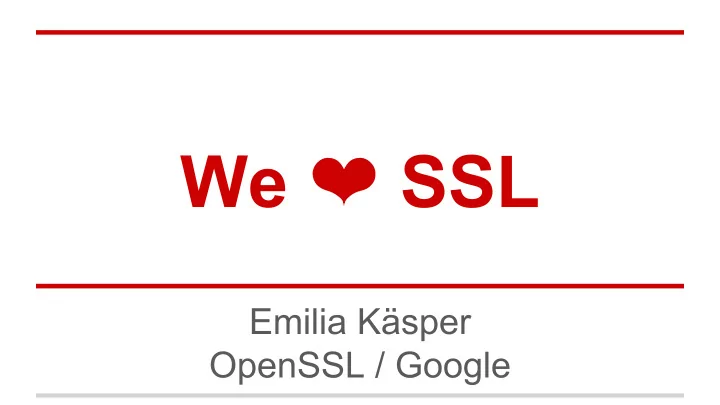

We ❤ SSL Emilia Käsper OpenSSL / Google
Let’s start with a guessing game... What is this graph about?
Myth: Heartbleed broke the Internet
Fact: Internet-breaking bugs are common ● CVE-2011-0014 - infoleak, true impact unknown ● CVE-2012-2110 - possibly arbitrary code execution on reading certificates ● CVE-2012-2333 - buffer over-read, true impact unknown ● CVE-2014-1266 - “goto fail” server spoofing (Apple) ● CVE-2014-0160 - Heartbleed ● CVE-2014-0224 - “early CCS” disables encryption ● CVE-2014-1568 - RSA signature forgery (NSS)
In this talk... ● A history of OpenSSL: the good, the bad and the ugly ● Heartbleed in the sea of exploits: why the hype, and what can we learn from this? ● The future of OpenSSL: what we’re doing, and how you can help.
Heartbleed - why the attention?
Heartbleed - why the attention? ● Branding => press coverage, pop culture ● Changed awareness: Snowden ● Simplicity of exploit ● Remote code executions aren’t concrete enough ● Offensive institutions are much better at judging bug impact. Recall… ○ CVE-2011-0014 - infoleak, true impact unknown ○ CVE-2012-2333 - buffer over-read, true impact unknown
Lesson #1: we need code review
Lesson #2: review != audit ● Code reviewers are not trained to find complex bugs. ● Few people are paid to audit critical codebases defensively. ● Fewer people are paid to turn vulnerabilities into exploits defensively. ● Offensive industry will routinely do this => huge edge in finding full exploit chains. ● You get what you pay for => we need to fix this are fixing this.
Changes in the OpenSSL team ● Expanded development team (3 FTE* + 12 volunteers) ● Mandatory code reviews ● New security policy ● New release strategy ● New blog :) *https://www.openssl.org/support/acknowledgments.html
New OpenSSL release today! ● Security updates for 1.0.1/1.0.0./0.9.8 ● Fixing 8 security vulnerabilities ● We get a lot of reports from academia & industry ● 5th security release since Heartbleed - this is a good thing!
How can the community help? ● Formal verification of crypto code ○ Hitting < 2^{-64} corner cases with unit testing is difficult. ○ New-ish elliptic curve implementations: P-224, P- 256, P-521 - fast and constant-time. But are they correct? ○ Regression testing (again!) for bug attacks and oracle attacks.
How can the community help? ● State machine analysis ○ Very old code, not written with adversarial behaviour in mind ○ Individual reports from different research groups… ○ ... => continuous regression testing?
How can the community help? ● Record/message/ASN.1 object layer fuzzing ○ Some open-source tools already available to help: ■ American Fuzzy Lop ■ Frankencert ● Smarter tools for finding/building exploits
How can the community help? ● Constant-time crypto ○ AES, RSA, P-256 quite well covered across platforms ○ But how about a library for implementing common operations (x = condition ? a : b)? ○ … or a constant-time code generator for field operations? ○ Authenticated encryption is brittle => need new primitives.
Questions? The OpenSSL development team: Matt Caswell, Mark J. Cox, Viktor Dukhovni, Steve Henson, Tim Hudson, Lutz Jänicke, Emilia Käsper , Ben Laurie , Richard Levitte, Steve Marquess, Bodo Möller, Andy Polyakov , Kurt Roeckx, Rich Salz, Geoff Thorpe Come talk to us!
Recommend
More recommend